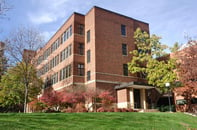Published on
Helping Bring Adult Students to the Mountain

The following interview is with Lorraine Prinsky, a trustee and past-president of the Coast Community College District (CCCD). One of the commuter colleges in the CCCD, Orange Coast College (OCC), recently acquired a plot of land to create campus housing. In this interview, Prinsky discusses the issue of campus housing for non-traditional students and shares her thoughts on how such a move will impact the college’s commuter status and its completion rates.
1. Why is on-campus housing a critical issue for commuter colleges?
It’s actually a growing trend. There are over 300 community colleges that offer housing throughout the United States. So OCC is not the first, [though] it may be locally in Southern California. It is a growing trend; more and more students want to live either on-campus or close to campus.
2. Looking specifically at non-traditional students, how would available campus housing support their retention and success?
I’m not really sure what you mean by non-traditional students; it just seems like so many of our students might be considered non-traditional. The fact is that the average student age in community colleges is 28. …
We’re aware that many of the students … it may even be a majority, something like 60-plus percent, of our students actually live outside of the Coast Community College District boundaries. So we’ve done surveys, we’ve had some consultants do some work for us, and we know there is an overwhelming need and interest for local affordable housing for students and that’s what we’re trying to do.
3. Would this housing be dormitory-style, as we see on traditional campuses, or would it be subdivided housing?
We’re still working on figuring this out. We’re doing more surveys, more marketing studies, and we may have a mixture of housing types to accommodate all kinds of different needs and students. This is something we still don’t know yet. We’ve been talking about this for years. Our district received funding from a major bond that was passed by our district residents last November and it’s going to take at least a couple more years of studying and planning and meeting with the city of Costa Mesa; finding out whether we need to get some zoning changes and whatever else we need to do legally.
We’re still working on this and working on figuring out what the best mix would be for our students.
4. Do you think introducing on-campus housing will change the commuter-geared nature of the college?
This is really hard to say. The fact is that an overwhelming number of our students work and go to school and are not totally full-time. But, one of the things we’re trying to do with a lot of changes that are coming — and the community colleges in general in California that we’re applying at OCC and the other colleges in our district — is working on student success and trying to figure out what is best to get students to complete. … That’s been one of the challenges in community colleges.
I think part of our work in our students’ success initiatives may also be to bring students closer, be more accessible and provide more affordable housing so that students can focus on their education.
Author Perspective: Administrator

